Posted by: Northwest Eye in General on October 7, 2025
Overview
We understand that experiencing changes in your vision can be concerning. This article highlights the critical symptoms of retinal detachment that you should recognize:
- Flashes of light
- An increase in floaters
- Blurred vision
Recognizing these symptoms is essential, as timely identification and medical intervention can significantly improve your recovery outcomes. Early diagnosis can lead to a successful treatment rate of approximately 90%, which is reassuring to know.
It’s common to feel anxious about these symptoms, but remember that you are not alone. Many patients have faced similar concerns and have found comfort in seeking help. We are here to guide you through this process, ensuring you receive the care you need. Your health and peace of mind are our top priorities.
Introduction
Recognizing the symptoms of retinal detachment is crucial for maintaining your vision health. We understand that many individuals may feel unaware of the warning signs that could indicate a serious condition. From sudden flashes of light to an increase in floaters, these symptoms can serve as critical alerts that necessitate immediate medical attention. However, it’s common to feel uncertain about distinguishing between benign visual disturbances and those that signal a potential retinal emergency. How can you empower yourself to act swiftly and prevent irreversible sight loss?
This article delves into the ten key symptoms of retinal detachment that every patient should recognize. We want to ensure you are equipped to seek timely care when it matters most, providing you with the reassurance you need on your journey to maintaining your vision health.
Northwest Eye: Expert Diagnosis of Retinal Detachment Symptoms
At Northwest Eye, we understand that concerns about your eye health can be overwhelming. Our group of skilled eye surgeons is dedicated to accurately identifying signs of eye separation. With over 50 years of expertise in eye care, we use cutting-edge diagnostic tools and techniques to ensure timely and effective treatment for our patients.
It’s common to feel uncertain when noticing changes in your vision. That’s why we emphasize patient education by clearly detailing the symptoms of retinal detachment, which include:
- New floaters
- Flashes of light
- Dark areas in your sight
Cloudy eyesight can also be an important sign that may suggest underlying problems, including separation of the retina. This proactive approach empowers you to seek immediate care, significantly enhancing your chances of preserving vision.
Studies indicate that approximately 85% of detached retinas can be successfully reattached if diagnosed early. This underscores the importance of awareness and prompt action. Additionally, the occurrence of rhegmatogenous separation (RRD) within one year of cataract surgery is about 0.21%, or approximately 1 in 500 cataract procedures. This highlights the importance of this condition for cataract patients.
We are here to help you through this process. Our dedication to patient education not only informs you about your eye health but also fosters a supportive environment where you can feel confident in managing your conditions. We urge you to be mindful of risk factors such as:
- Age
- Past eye surgeries
- Conditions like high myopia
These factors can elevate the chances of separation of the retina.
If you notice symptoms of retinal detachment such as flashing lights, floaters, or blurred sight, it is essential to undergo an eye examination within 24 hours to avoid potential loss of sight. Schedule an appointment with a Northwest Eye doctor today to ensure your eye health is prioritized.
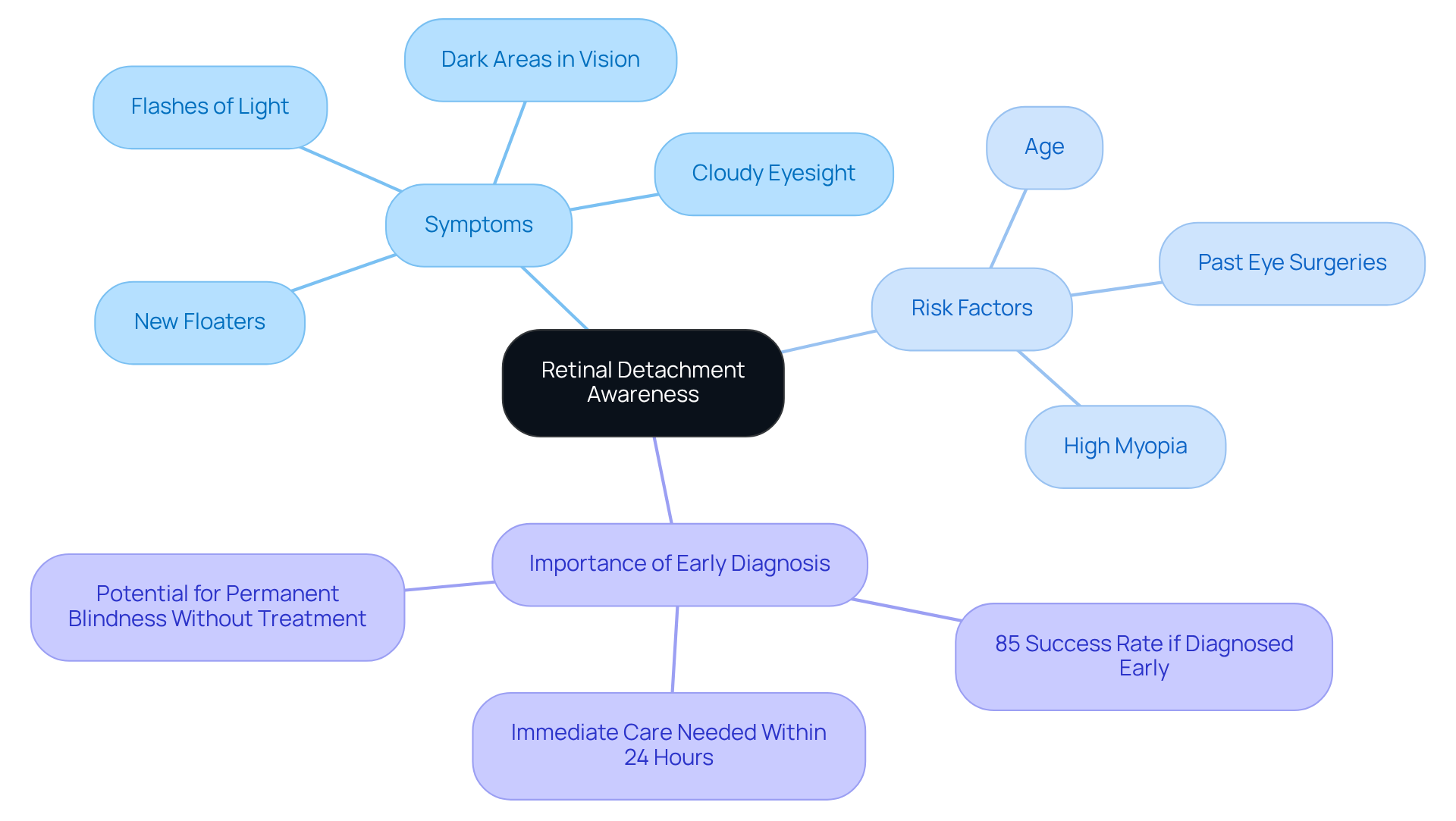
Sudden Vision Changes: A Warning Sign of Retinal Detachment
We understand that abrupt changes in your vision, like blurriness or a sudden decrease in clarity, can be alarming. These symptoms of retinal detachment may indicate a separation of the retina, which is a serious condition. Blurred vision can arise from various issues, including:
- cataracts
- diabetic retinopathy
- dry eyes
- macular degeneration
- uncorrected refractive errors
This can happen unexpectedly and might be accompanied by flashes of light or an increase in floaters.
It’s common to feel discomfort or pain when experiencing these symptoms; studies show that about 20% of individuals with eye separation report such sensations. This highlights the importance of seeking immediate medical attention. It is crucial to identify the symptoms of retinal detachment early. When patients act quickly, recovery rates can exceed 90%, helping to prevent permanent vision loss.
Ophthalmologists emphasize the importance of being aware of the symptoms of retinal detachment as warning signs to protect your eye health. Untreated conditions can lead to irreversible damage, and for instance, untreated eye ruptures can cause separation of the eye tissue in 33% to 46% of cases. If you notice sudden changes in your vision, we encourage you to contact an eye care professional at Northwest Eye right away. Scheduling an appointment for a thorough evaluation is a vital step towards ensuring your eye health and well-being.
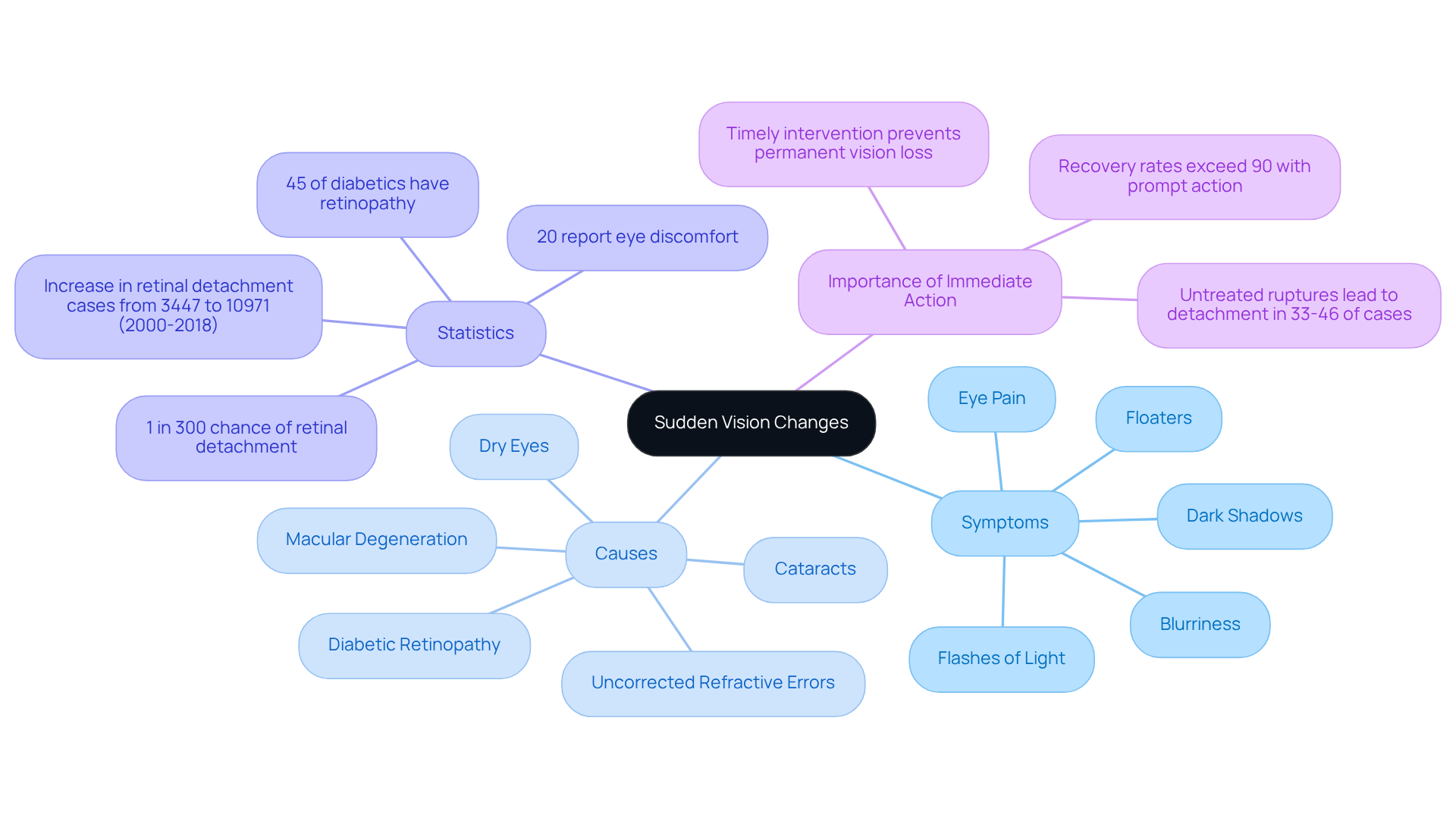
Flashes of Light: Recognizing a Potential Retinal Emergency
Flashes of light, often perceived as brief bursts or streaks, can indicate that the retina is being pulled or irritated—a condition known as photopsia. We understand that experiencing these flashes can be concerning. This phenomenon serves as an early warning sign of potential eye separation and may present symptoms of retinal detachment, particularly common among individuals aged 50 to 69. Approximately 49% of patients who notice light flashes report photopsia, which is one of the common symptoms of retinal detachment, before being diagnosed with eye separation.
It’s important to know that about 1 in 500 cataract surgeries in people over 40 can lead to symptoms of retinal detachment, specifically rhegmatogenous retinal detachment (RRD), within a year. This highlights the significance of recognizing symptoms of retinal detachment, including photopsia, in this age group. If you notice these flashes, seeking immediate medical attention is crucial, as they may be symptoms of retinal detachment, indicating a serious underlying issue that requires prompt intervention.
Dr. Sònia Viver emphasizes that timely treatment can prevent permanent sight loss. By being aware of the symptoms of retinal detachment, you can take proactive steps for effective management. Real-life cases show how recognizing photopsia has led to timely interventions, ultimately preserving vision and improving patient outcomes.
Additionally, photopsia can significantly disrupt daily activities. We encourage you to seek necessary care before conditions worsen. If you experience flashes of light, please consult an eye care professional promptly to ensure your eye health is safeguarded. Remember, we are here to help you through this process.
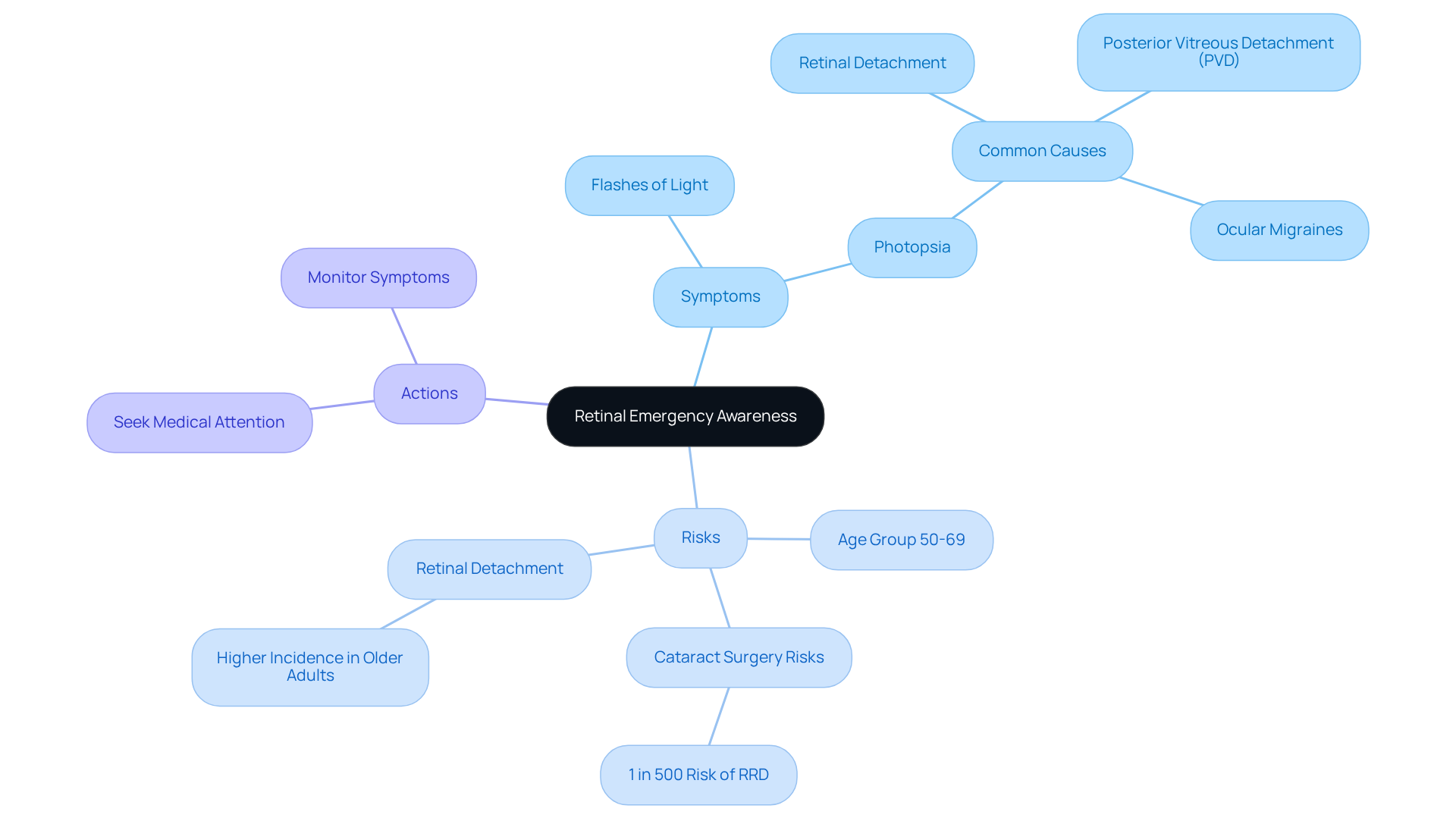
Increased Floaters: Understanding Their Role in Retinal Detachment
An abrupt rise in floaters—those small dark spots or squiggly lines drifting across your vision—can understandably cause concern, as they may indicate a serious condition such as separation of the retina. While floaters are quite common, especially for individuals over 65, with about 75% experiencing them, it’s important not to ignore any notable changes in their frequency or appearance. Research shows that roughly 28% of individuals diagnosed with eye tears reported new signs of posterior vitreous separation or ocular complications within 4.5 years. This connection between floaters and potential eye problems is crucial to recognize.
If you notice a significant rise in floaters, we encourage you to consult your eye care professional promptly. This could signify a tear or detachment of the retina. Eye care professionals, like Dr. Borkar, emphasize the importance of these signs, stating, “If you notice a significant rise in floaters, the most advisable action is to visit the ophthalmologist’s office promptly.” Moreover, studies indicate that patients who seek treatment within the first day of noticing issues face a greater risk of eye tears, highlighting the necessity for timely assessment.
In fact, 83% of confirmed eye tears were diagnosed within the first week of symptom onset. This statistic underscores the importance of being vigilant about changes in your sight. If floaters are accompanied by flashes of light or a sudden curtain-like shadow over your vision, these could be considered symptoms of retinal detachment that require urgent medical care. Understanding these connections can empower you to take proactive steps in safeguarding your eye health. Remember, we are here to help you through this process.
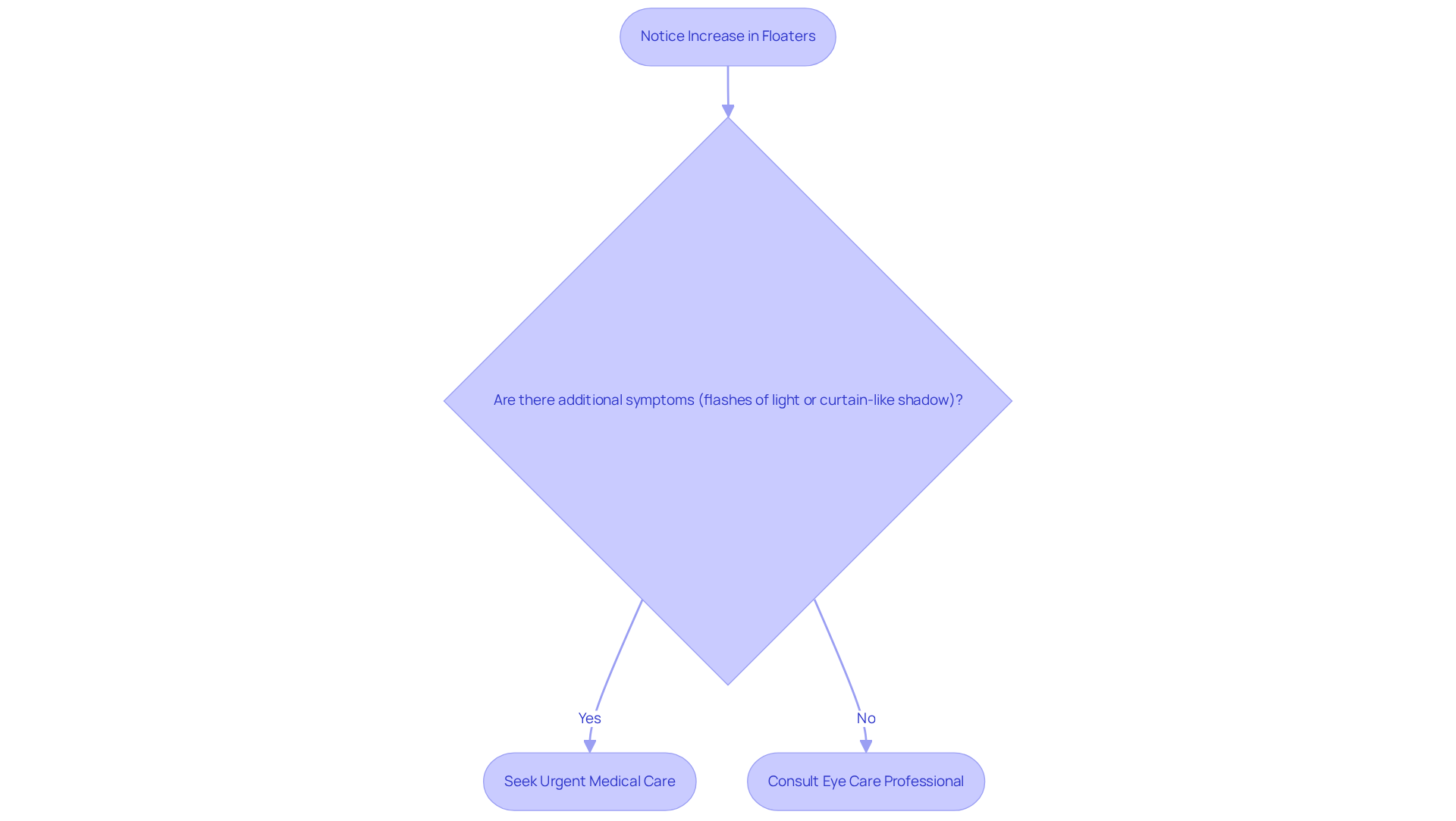
Shadow or Curtain Effect: Identifying a Serious Vision Threat
If you notice a shadow or curtain falling over your field of vision, it’s important to understand that this can be a significant warning sign of the symptoms of retinal detachment. This indicates that the retina may be pulling away from its normal position, which requires immediate medical attention. We recognize how alarming this can be, and research shows that about 50% of patients experiencing symptoms of retinal detachment report blurred vision. This can stem from various conditions, such as cataracts or diabetic retinopathy, underscoring the urgency of the situation. Unclear sight may signal serious eye diseases, and we want to ensure you feel supported in addressing this.
Additionally, individuals showing symptoms of retinal detachment, such as eye tears, are 17.7 times more likely to experience separation in the same eye over a 4.5-year follow-up period. We understand that this information can be concerning, which is why experts strongly recommend seeking urgent eye care to prevent irreversible sight loss. As Dr. Gargi Madhukar Apte explains, “the separation of the eye’s inner layer happens when it attempts to pull away from the rear of the eye and is regarded as a critical condition that requires urgent treatment.” Timely intervention is crucial, as neglecting to act quickly can lead to severe complications, including permanent impairment of sight. Remember, we are here to help you through this process.
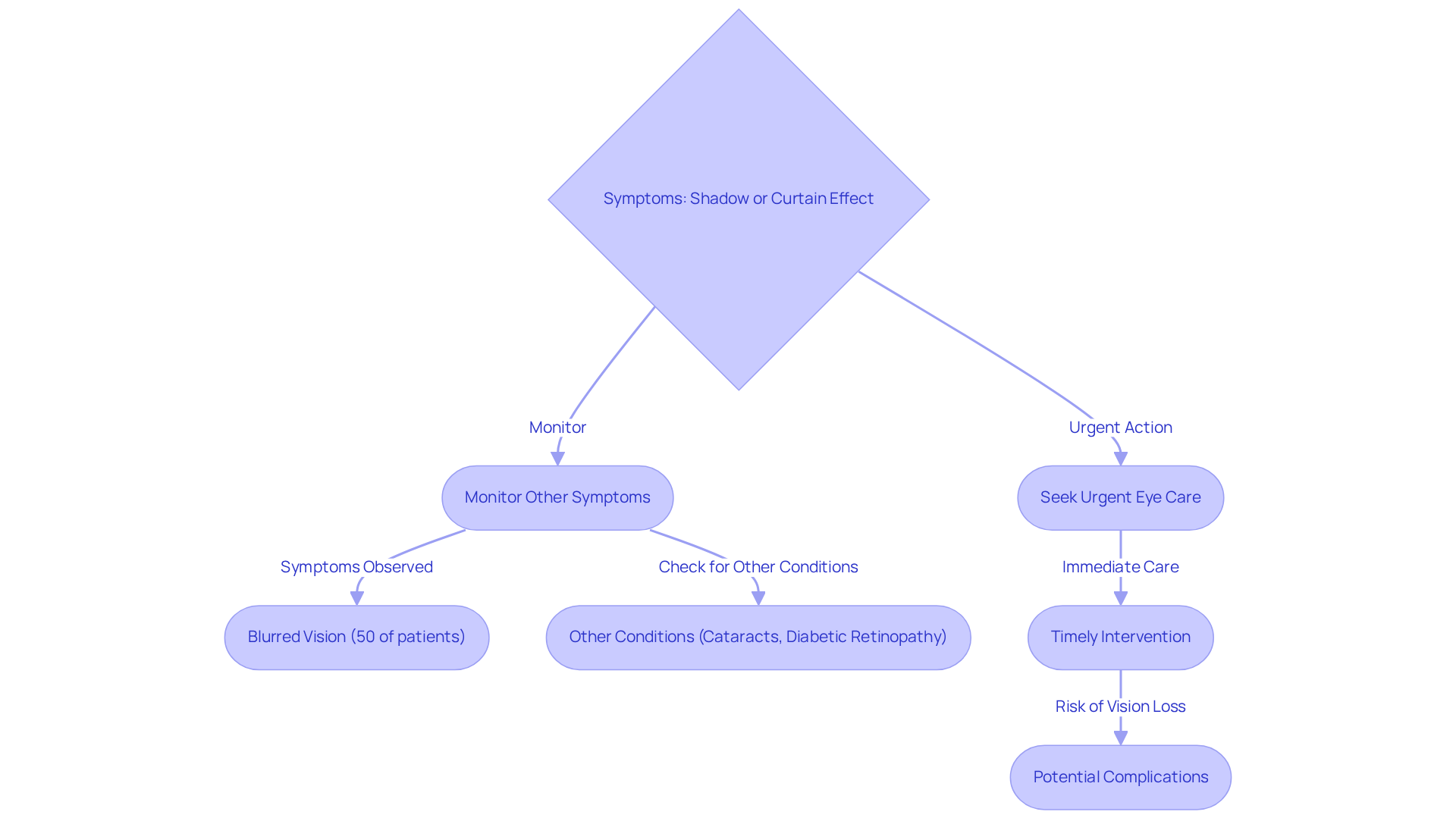
Blurred Vision: A Key Symptom of Retinal Detachment
Blurred vision is a significant sign of various eye disorders, including the symptoms of retinal detachment. Many patients describe this experience as a sudden loss of sharpness that makes it difficult to see fine details. It’s important to know that around 50% of individuals experiencing retinal separation report blurred vision, which is one of the symptoms of retinal detachment, along with other concerning signs, such as flashes of light and floaters. This combination calls for immediate medical evaluation, as timely intervention can greatly improve recovery outcomes.
We understand that sudden changes in vision, especially blurred sight, can be alarming. Research shows that individuals with eye tears are 17.7 times more likely to face vision separation during follow-up. Thankfully, treatment for retinal separation is effective for nine out of ten patients, underscoring the critical importance of early detection and action.
When blurred vision is one of the symptoms of retinal detachment, effective treatments like cryotherapy or laser photocoagulation can prevent further complications and restore sight. Recognizing blurred vision as a serious indicator is vital for preserving vision and ensuring that you receive the necessary care promptly. Remember, we are here to help you through this process.
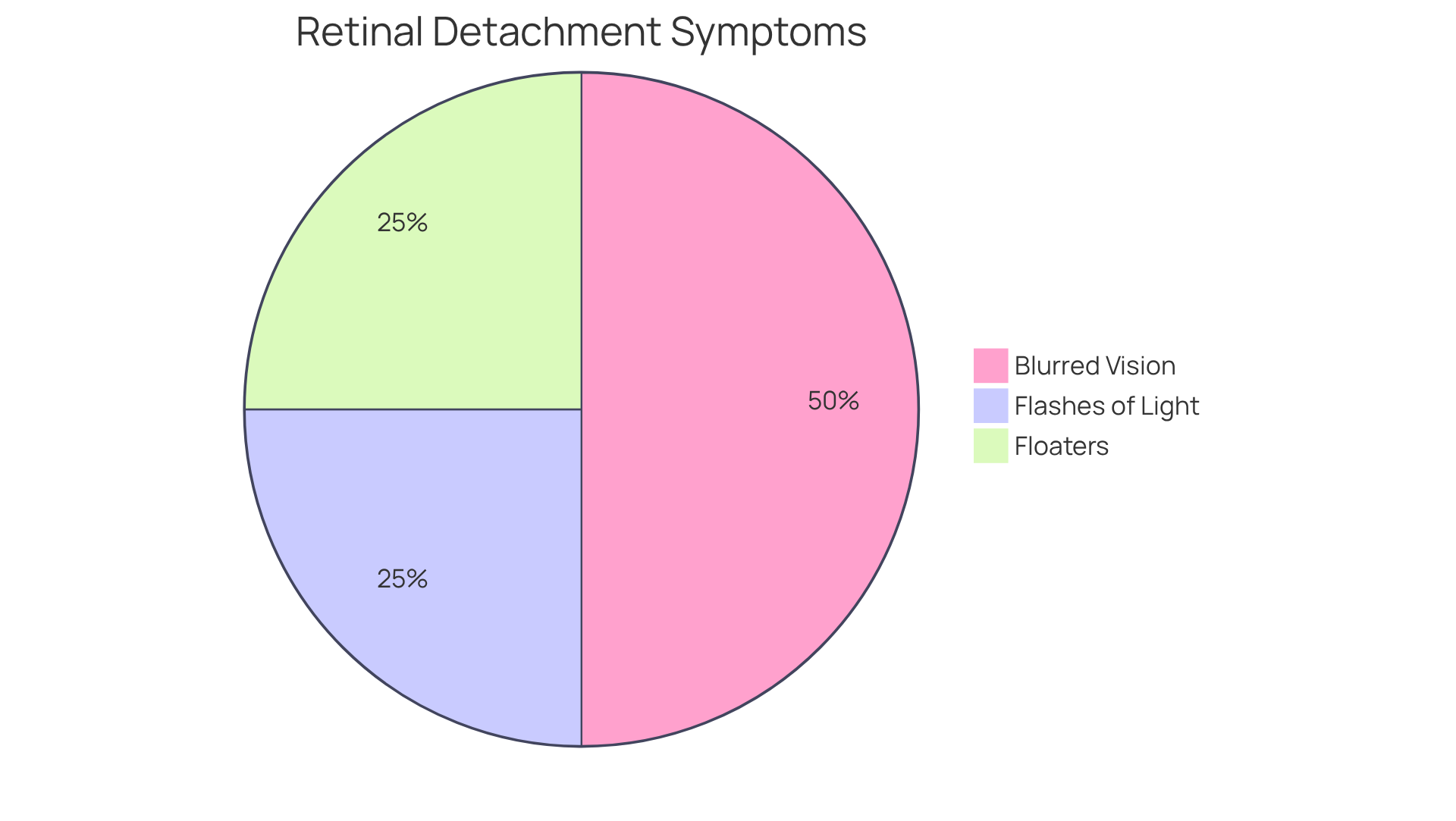
Distorted Vision: Recognizing Signs of Retinal Detachment
Distorted sight, where familiar objects appear wavy or bent, can be a significant warning sign of the symptoms of retinal detachment. We understand that experiencing such changes can be concerning. This sign often occurs alongside other indicators, such as flashes of light or an increase in floaters, which are considered symptoms of retinal detachment. In fact, studies show that nearly 67% of individuals who experience retinal separation report encountering symptoms of retinal detachment before their diagnosis. A study involving 1,010 patients revealed that 62% experienced both photopsia and floaters, which are common symptoms of retinal detachment.
Additionally, unclear sight can serve as a crucial indication, arising from various irregularities, including nearsightedness, farsightedness, or even ocular conditions like cataracts and macular degeneration. It’s common to feel uncertain or anxious about these visual disturbances, but ophthalmologists stress the importance of not dismissing them. They can signal a serious condition that requires immediate evaluation and treatment.
Identifying wavy objects and unclear sight are important as they can be symptoms of retinal detachment. We encourage you to seek prompt intervention, as it can greatly enhance outcomes and help maintain your sight. Remember, we are here to help you through this process.
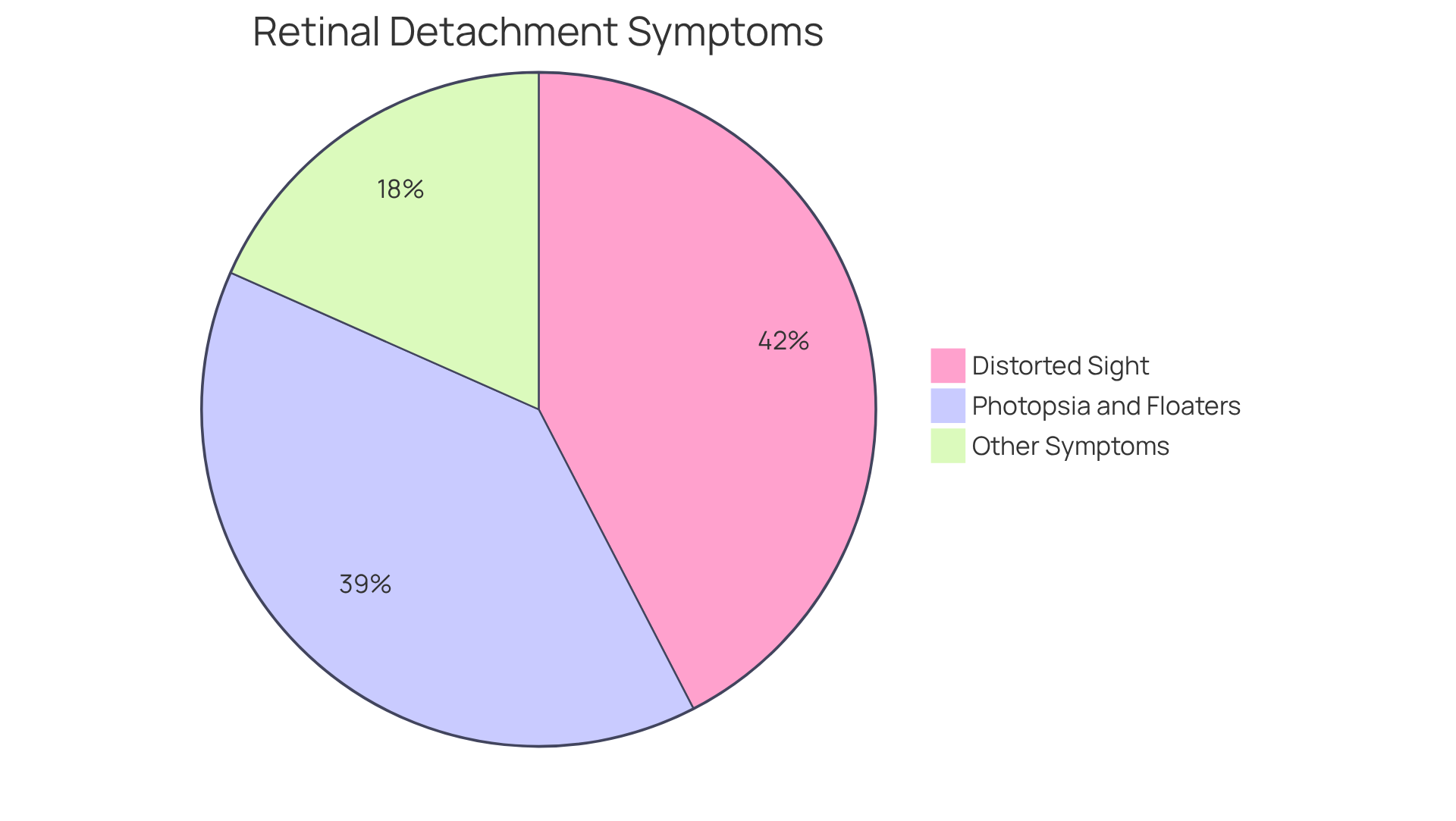
Sudden Loss of Peripheral Vision: A Critical Indicator
A sudden loss of peripheral sight can be a critical indicator of symptoms of retinal detachment, and we understand how alarming that can be. Patients often experience a significant reduction in their peripheral vision, which can drastically affect their overall visual field. This symptom frequently appears abruptly, which is one of the symptoms of retinal detachment, signaling the need for immediate medical attention. Eye experts emphasize the importance of recognizing this change, as prompt intervention can substantially decrease the risk of lasting sight loss.
Individuals over the age of 50 are particularly susceptible to this condition, making awareness and prompt action essential. It’s common to feel concerned about such changes in your vision. Additionally, a rapid increase in floaters may suggest a separation of the retina, while blurred vision can be among the symptoms of retinal detachment, stemming from various issues, including cataracts or uncorrected refractive errors.
If you notice any sudden changes in your peripheral eyesight, an increase in floaters, or hazy vision, these may be symptoms of retinal detachment, so we urge you to seek urgent eye care from Northwest Eye. Your sight is precious, and obtaining care promptly is vital to safeguarding it. Remember, we are here to help you through this process.
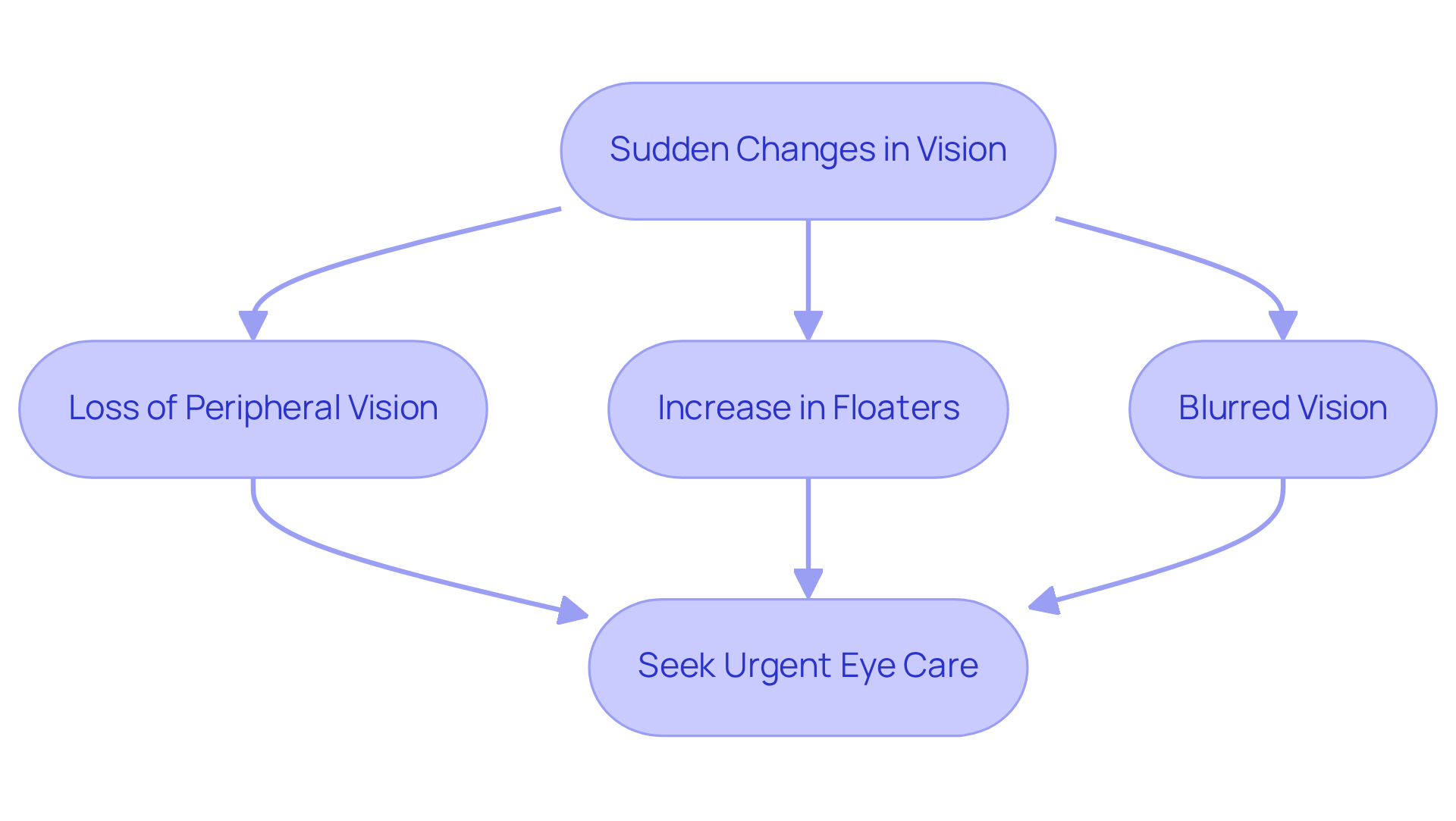
Dark Spot in Vision: A Sign of Possible Retinal Detachment
Noticing a dark area in your vision can be alarming, and it’s important to understand that this could indicate symptoms of retinal detachment. This dark area may appear as a fixed spot or a scotoma, which can be symptoms of retinal detachment, indicating that your retina might be at risk. Research shows that around 50% of patients report seeing dark spots, which are symptoms of retinal detachment, prior to being diagnosed with eye separation.
We understand how concerning these visual changes can be, and it’s crucial not to overlook them. Seeking immediate medical evaluation is essential to uncover the underlying cause and to begin appropriate treatment. Ignoring these signs can lead to serious consequences, including the irreversible loss of sight.
Recognizing the connection between scotomas and the symptoms of retinal detachment is vital. Taking prompt action can significantly enhance your chances of recovery. Remember, we are here to help you through this process, ensuring you receive the care and support you need.
Understanding Symptoms: When to Seek Emergency Eye Care
Identifying the symptoms of retinal detachment is essential for maintaining your sight. We understand that noticing sudden changes in your vision can be alarming. If you experience:
- Flashes of light
- An increase in floaters
- A shadow or curtain effect obscuring your view
These could be symptoms of retinal detachment, and it’s important to seek emergency eye care immediately. Other warning signs to be aware of include:
- Blurred or distorted vision
- Sudden loss of peripheral sight
- Dark spots appearing in your visual field
- Symptoms of retinal detachment, which may indicate underlying conditions such as cataracts or diabetic retinopathy.
Prompt medical attention can significantly enhance the likelihood of successful treatment. In fact, repair success rates can reach approximately 90% when intervention occurs early. However, we know that many patients postpone seeking treatment. Research suggests that a considerable number of individuals wait too long after noticing issues, which can lead to permanent vision loss. Successful emergency care responses have shown that immediate action can prevent severe complications related to the symptoms of retinal detachment.
Therefore, it’s crucial to be aware of the symptoms of retinal detachment and the urgency of seeking assistance. If you notice any of these symptoms, including blurred vision, we encourage you to schedule a comprehensive, dilated eye exam with a Northwest Eye doctor as soon as possible. Remember, we are here to help you through this process.
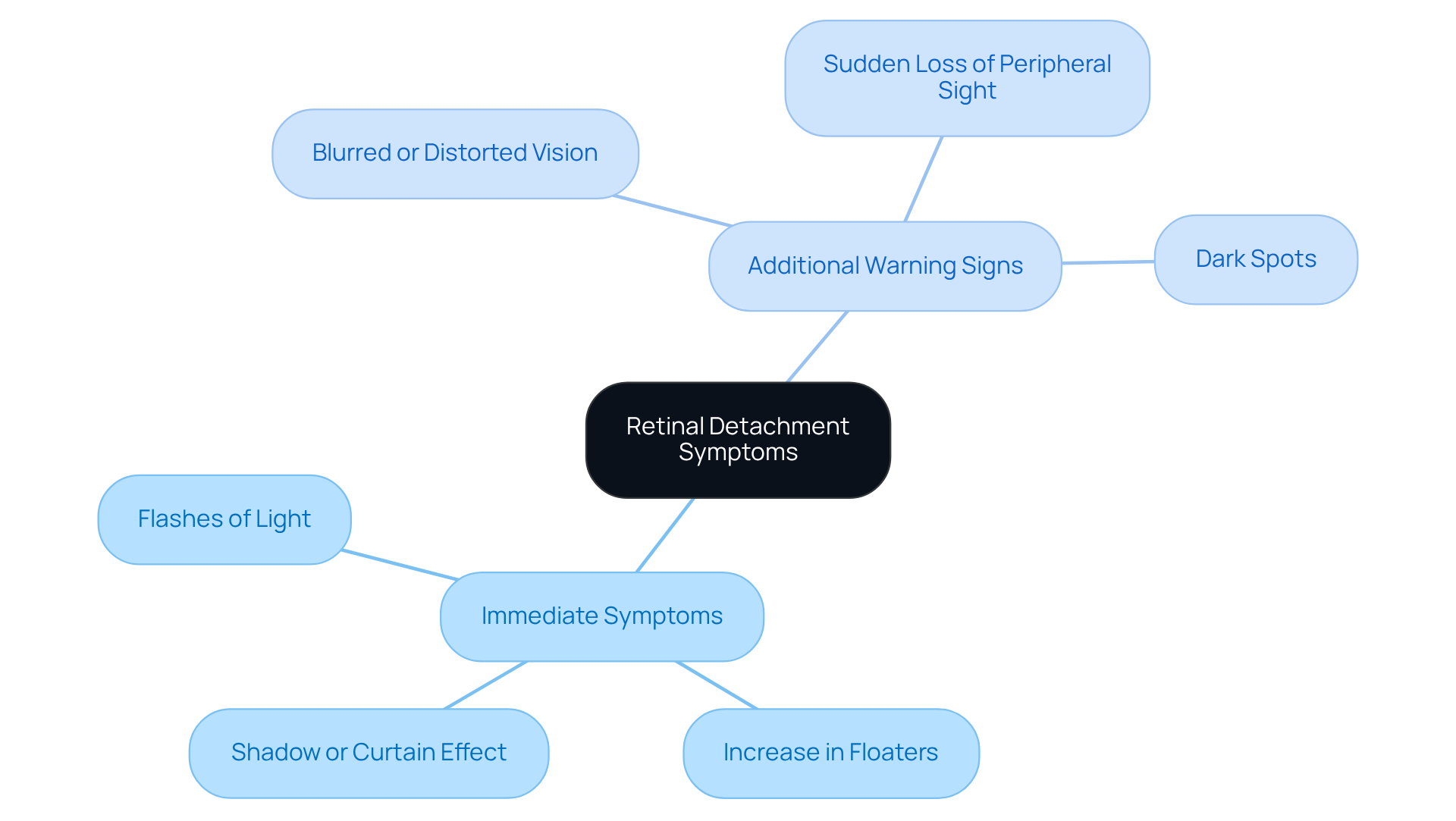
Conclusion
Recognizing the symptoms of retinal detachment is crucial for preserving your vision and ensuring timely medical intervention. It’s important to be aware of various warning signs, such as:
- Flashes of light
- Increased floaters
- Blurred vision
- Shadow or curtain effect
Each of these symptoms serves as a critical indicator that should not be overlooked. Remember, prompt action can significantly enhance recovery outcomes.
We understand that it can be concerning to experience these symptoms. Key insights show that these signs are prevalent among patients, and treatment success rates are high when detected early. Studies indicate that nearly 85% of detached retinas can be successfully reattached if addressed promptly. Thus, understanding the risk factors and being vigilant about any sudden changes in your vision is essential, especially if you are over 50 or have a history of eye issues.
Ultimately, safeguarding your eye health requires a proactive approach. If you experience any symptoms of retinal detachment, please seek immediate medical attention to prevent irreversible damage. Awareness and education empower you to take charge of your eye health, reinforcing the message that timely intervention can make a significant difference in preserving your sight. Remember, prioritizing your eye care today can lead to a healthier tomorrow.
Frequently Asked Questions
What are the common symptoms of retinal detachment?
Common symptoms of retinal detachment include new floaters, flashes of light, dark areas in your sight, and cloudy eyesight.
Why is it important to recognize symptoms of retinal detachment early?
Recognizing symptoms early is crucial because approximately 85% of detached retinas can be successfully reattached if diagnosed promptly, significantly enhancing the chances of preserving vision.
What risk factors can increase the likelihood of retinal detachment?
Risk factors for retinal detachment include age, past eye surgeries, and conditions like high myopia.
What should I do if I notice symptoms of retinal detachment?
If you notice symptoms such as flashing lights, floaters, or blurred sight, it’s essential to undergo an eye examination within 24 hours to avoid potential loss of sight.
What other conditions can cause sudden changes in vision?
Sudden changes in vision, like blurriness or decreased clarity, can also arise from cataracts, diabetic retinopathy, dry eyes, macular degeneration, and uncorrected refractive errors.
How serious is the condition of retinal detachment?
Retinal detachment is a serious condition that can lead to permanent vision loss if not treated promptly. Studies indicate that quick action can lead to recovery rates exceeding 90%.
What are flashes of light, and what do they indicate?
Flashes of light, or photopsia, can indicate that the retina is being pulled or irritated and may be an early warning sign of potential retinal detachment.
Who is most at risk for retinal detachment symptoms after cataract surgery?
Individuals over 40 years old are at risk, with about 1 in 500 cataract surgeries potentially leading to symptoms of retinal detachment within a year.
What should I do if I experience flashes of light?
If you experience flashes of light, it is crucial to seek immediate medical attention, as they may indicate a serious underlying issue related to retinal detachment.






